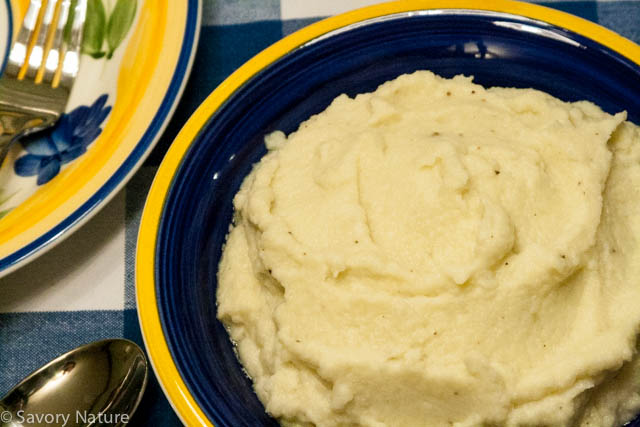Mashed cauliflower is a great alternative to mashed potatoes. Subtly flavored and creamy, it’s great with gravy or as a base for anything you’d normally put on mashed potatoes. I’ll be posting a Salisbury steak recipe soon that I served over mashed cauliflower – yum, comfort food!
Cauliflower vs. Potatoes – A Nutritional Comparison
In the vitamins and minerals category, cauliflower and potatoes are pretty comparable, although cauliflower offers significantly more vitamin C and vitamin K. For a detailed listing of nutrients, check out these links to USDA’s National Nutrient Database for cauliflower and potatoes. Cauliflower also contains glucosinolates, the phytonutrients in cruciferous vegetables that may reduce cancer risk.
Mashed cauliflower is much lower in calories and glycemic load than mashed potatoes.
The big differences between mashed potatoes and mashed cauliflower are calories and glycemic load. Glycemic load is a measure of how much a normal-size serving of food is likely to increase your blood sugar. A glycemic load greater than 20 is considered high, while 11-19 is medium and 10 and below is low. Excessive blood sugar contributes to diabetes, weight gain and cardiovascular problems – lots of good reasons to manage glycemic load in your diet. So how do cauliflower and potatoes stack up? A 150-gram serving (about a cup) of boiled cauliflower has 35 calories and an estimated glycemic load of 0-1. The same size serving of boiled peeled white potatoes has 130 calories and a glycemic load of about 21. Calorie counts are from calorieking.com and glycemic load value is from Harvard Health Publications.
A Mashed Cauliflower Tip
I tried mashing the cauliflower with a potato masher and blending in the almond milk and margarine with a hand mixer and they came out ok. The next time, I used a food processor and got a much creamier consistency. I highly recommend that approach.
A Word About Allergens
My version of this recipe is dairy-free, but feel free to use real milk and butter if you don’t have a problem with dairy. I use almond milk, but rice milk, soy milk or coconut milk would also work. Earth Balance makes a good dairy-free margarine and they have a soy-free version as well.
Give mashed cauliflower a try!
Why not give mashed cauliflower a try next time you’re thinking about mashed potatoes? You’ll be amazed how creamy and satisfying it is, and so good for your health and your waistline!
- 1 head of cauliflower, cored and roughly chopped
- water
- 3 Tbsp margarine (use dairy-free, soy-free or butter depending on your sensitivities)
- ½ tsp salt
- ground black pepper to taste
- ¼ cup or more almond milk (or rice milk, soy milk or coconut milk or milk depending on your preference/sensitivities)
- Put about an inch of water in a large saucepan and add cauliflower.
- Heat to boiling, cover, and boil gently about 10 minutes until cauliflower is fork tender.
- Drain in a colander.
- Add cauliflower, 3 Tbsp margarine, salt, pepper and ¼ cup almond milk to processor and process until creamy. If it’s too thick, add more almond milk a little bit at a time and reprocess.







Leave a Reply